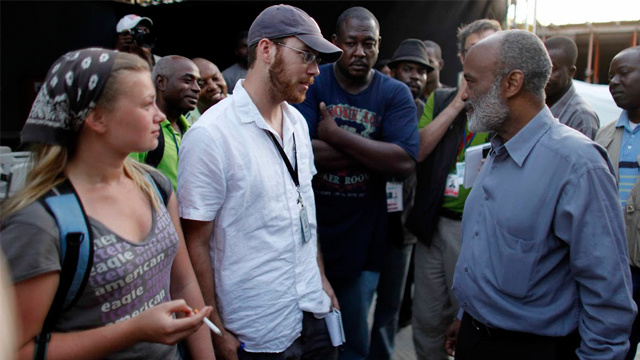Haiti quake: Why isn't aid money going to Haitians?
- Published
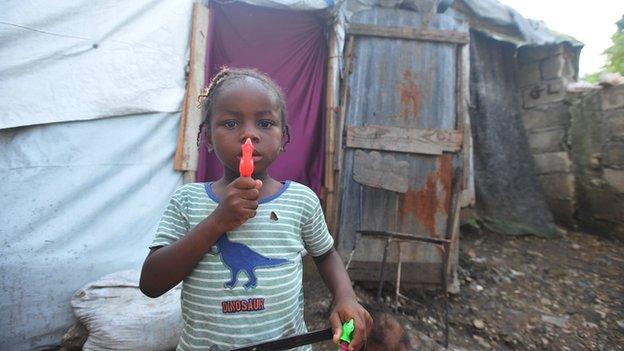
Three years on from Haiti's devastating earthquake, the country's UN special envoy has revealed little official aid money has gone to the country's government and organisations. Why is the funding bypassing Haitians?
After the Earth shook beneath Haiti's capital Port-au-Prince in the late afternoon of 12 January 2010, the epic scale of the destruction soon became clear.
Many of the country's poorly-constructed buildings had simply disintegrated, leaving 200,000 people dead and more than two million without homes.
These scenes of human suffering prompted many of us to dig deep into our pockets and vast sums of money were raised by the UN, international charities and other non-governmental organisations. Public bodies pledged even more.
'Costly temporary clinics'
Some $9bn (£5.6bn) of international assistance was given - $3bn from private individuals and companies and $6bn from governments and global institutions (known as bilateral and multilateral donors), according to the Office of the Special Envoy for Haiti (OSE), external.
But what the OSE and others have been asking is why less than 10% of the $6bn from public donors has gone to the Haitian government and why less than 1% was given to local organisations.
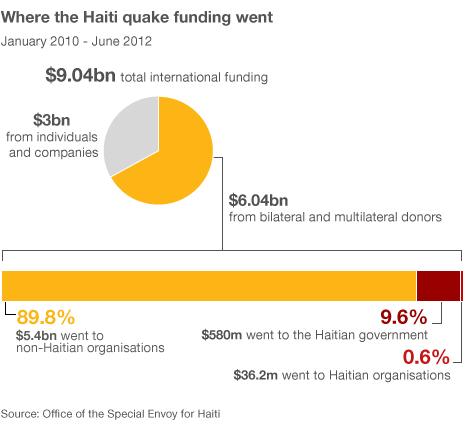
"Public institutions were often and usually inadvertently sidelined by well-meaning organisations that rushed in to provide emergency services," says Deputy Special Envoy Dr Paul Farmer in the OSE report. "Many set up costly temporary clinics while the public sector institutions did not and do not have enough funds to pay the salaries of its doctors and nurses."
"Our experience in Haiti has reminded us that when it comes to aid dollars, how and where we spend them is often as important as how much we spend," he concludes.
The report suggests that concerns about corruption and weak institutions meant international donors were reluctant to channel money through Haiti's organisations.
'Government support needed'
But its authors suggest that instead of sidelining the country's government, donors should have done more to support it to take the lead.
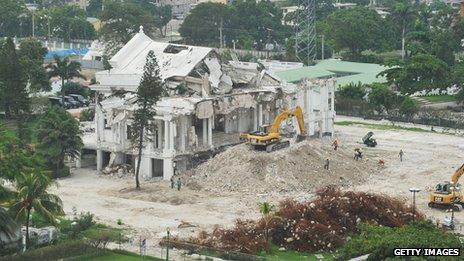
Reconstruction is a slow process in a country which was struggling even before the 2010 quake
The International Federation of Red Cross and Red Crescent Society in Haiti, external says the report's conclusions should be welcomed.
"It is good that we are finally discussing this. The government needs to have more control of more resources," says Alex Claudon, the charity's Haiti representative. But he explains that things are improving.
"You can actually see it. The government is really leading. We have seen this during the hurricane season with Hurricane Sandy. The national system is doing its best to lead the international response."
The United Nations Development Programme (UNDP) agrees that national leadership is getting stronger.
But senior country director Sophie De Caen says it is important to remember that Haiti - a country already suffering historical political instability and widespread poverty - was seriously damaged by the 2010 disaster. Many government workers lost their lives.
"You had a very weak government right after the earthquake in part because of the decimation of civil servants," she explains.
The priority now is building up the capacity of government to lead, she says, and she too cites the state response to Hurricanes Isaac and Sandy in 2012 as an example of how the country is moving forward.
"This was a major success for the government to lead on these initiatives," she says. "Our preference is always to have government leadership, but there is still a way to go, because you have to have the systems in place and this takes time."
But most still accept, despite the billions of pounds of aid, progress in Haiti has been slow.
Some 358,000 people remain in temporary accommodation with little access to sanitation, health care and education, according to Oxfam.
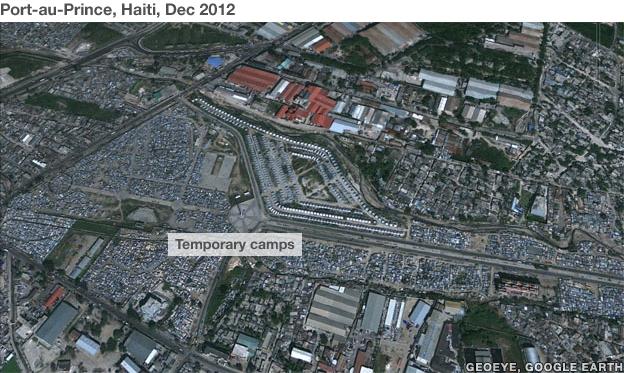
And the Canadian government, frustrated with progress, recently announced it was reviewing its aid contributions.
But those working to improve conditions say it is easy to forget the dire conditions Haiti was facing in January 2010.
"It is always important to put these things into context to remember what happened three years ago in Port-au-Prince. There was total destruction and then there was cholera," explains the Red Cross's Alex Claudon.
However, those working to improve conditions in Haiti, insist progress is being made.
Rising school attendance
Some 80% of the 10 million cubic metres of debris has been cleared - and some of it even used to reconstruct homes and footpaths.
A number of temporary camps have been closed and the Haitian government has helped more than 53,000 people move back into their neighbourhoods, through cash grants, rental subsidies, and investment in services.
While a significant number of people do remain in camps, it is not just about getting people out of tents and into houses, says the UNDP's Sophie De Caen.
"You need to ensure they are getting back to neighbourhoods that are safe and that have access to basic services, she explains.
"You also need the support at the community level and time to rebuild the houses."
But there are other reasons to be hopeful, she adds. Rising school attendance, environmental progress - such as tree-planting and river bank strengthening - are all welcome improvements.
However, for the Red Cross's Alex Claudon, there will be one important sign of success come the fourth anniversary of the quake.
"Our biggest hope is that there won't be anyone living in a camp by next year," he says.
- Published10 January 2013
